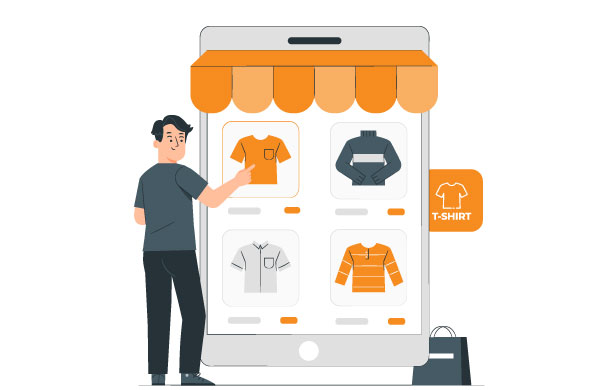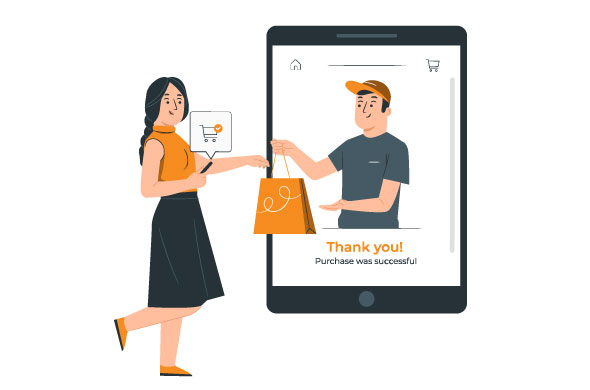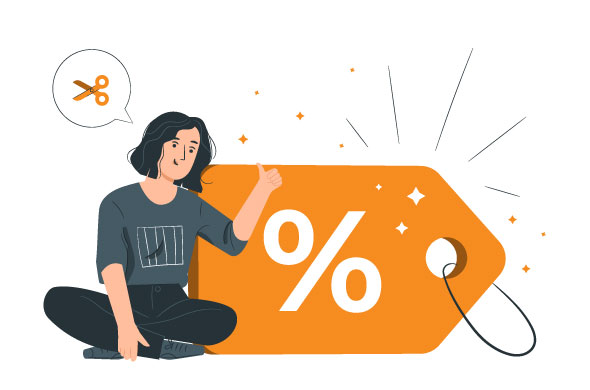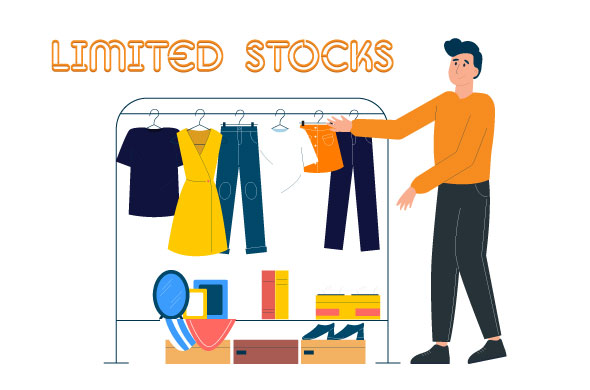Clothes have a very large market and a consistent demand in a holistic view. However, that does not mean that clothes are easy to sell, especially those that belong to specific types. It’s also difficult and impractical to establish these niche clothes shops especially in places where the market is small.
On the other hand, this means that the people looking for these types of clothes have a hard time finding them. Even if they do, there’s a high chance that there’s a conflict with the distance or there are not enough options.
Cue the internet to the rescue. The internet, being home to such a large number of prospective clients, provides businesses, particularly those that are locally owned and operated, with numerous opportunities to carve out their own space and communicate with a larger group of prospective clients.
There are all sorts of clients out there, each needing a unique variety of things. But as an aspiring business owner, the trick is not to cater to everyone but rather to focus on a certain demographic, as the old business tip says. So, instead of competing with big brands and independent sellers of teen and adult clothes, why not concentrate on baby clothes instead?
While it has its own fairly large market, it also contains lots of niche subsets similar to teen and adult clothes, but specifically just for babies.. While they don’t have to actually conform to the latest fashion trends, consumers in this age group give businesses the opportunity to broaden their user base.
Are you considering selling baby clothes as an online business? Here are some tips to help you nail your baby clothing business endeavor.
How to Sell Baby Clothes Online? Here are 5 Surefire Tips
1. Prepare

Before proceeding to the best ways to sell baby clothes, there are things you need to consider beforehand. After all, it won’t do to get into online selling without any sort of preparation.
If you’re planning on reselling your stock of unused baby clothes or from a thrift supplier:
- First, sort out what can and can’t be sold. You’d be hard-pressed to find someone willing to buy a shirt full of holes or decorated with permanent stains.
- Though it was previously mentioned that babies don’t care about the latest fashion, it would be prudent to choose clothes that were bought within the last few years. Unless it’s something unique and unused.
- Sort further and organize the clothes good for selling into sizes or any organizational criteria you prefer. You can even sort them by quality, separating the really good ones as their own category.
- Clean them up so they don’t smell like they’ve been in storage for a while and even iron them if possible to remove any wrinkles. That way they look good in front of the camera and in actuality.
Meanwhile, if you’re planning on selling brand new clothes:
- Make sure to have an ample storage space that can house your stock. Even better if there is an organizational system that helps prevent any damage that may affect the clothes’ price.
If possible, add some way of ventilating to avoid mold. Likewise, make sure to often clean the space to prevent any sort of infestation like rats, moths, and other pests that may cause damage to the clothes.
- If you don’t have enough space, try the dropshipping method instead. In dropshipping, you enter an agreement with a supplier and they can handle the stock and storage–sometimes even the shipping as well–and you handle the job of selling these products.
The challenge here is then to find a reputable supplier and hash out a good and beneficial agreement. So, conducting thorough research is key. Because if the supplier’s reputation is not that great or their products are of lesser quality than advertised, your reputation will suffer as well. Also, if you’re opting for dropshipping service, make sure that you have a dropshipping customer service in place to ensure that all your transactions goes without a hitch,
Whether your products are new or not, you also have to pay attention to the photo composition. There’s no need for a fancy professional camera; your phone will suffice, as long as the photo is crisp and clear. Remember that the clothes will be sold online, which means the provided photos will be the prospective customer’s only visual references.
Talk to our team!
Send Me a Quote
2. Sell on a social media marketplace

You may ask, "Where can I sell baby clothes?" If you want to start small, you can first try social media marketplaces.
Sites like Facebook and Instagram have their own marketplaces where users can post product listings without having to create a separate online shop account.
A main advantage is that your listings can be immediately seen by your friends or followers. The platform also has a set format that is easy to use, even for beginners.
One of the downsides of a social media marketplace, however, is the lack of control over more in-depth customization and technical control.
3. Create an online shop

If you’re ready to manage an online shop, consider the following steps:
- Choose the right platform. There are a lot of choices, from general marketplaces like Amazon or specialized ones like Etsy. Research on each platform’s features and its advantages.
There’s also an option to create your own website using general website creating platforms like WordPress or those that are specifically catered to ecommerce like Shopify.
It’s not required to choose just one platform, it’s just a matter of your ability to manage all of them.
- Work on your brand. What is your online shop’s name? What is your shop’s aesthetic? How can customers distinguish you?
Besides being aesthetically pleasing, your design should also reflect what your shop is all about and be functional. Simple things like using a universally readable font and compatible colors add to the inclusivity and accessibility of your shop.
- So you’re done with creating your online shop, it’s time to fill it up. Make your shop easy to navigate by employing effective product catalog management.
Create the product listings using the photos you took. Add a clear and direct description. Format it so that it can be read quickly and there are no misunderstandings.
Just like in the preparation phase, sort the products into their respective categories. Provide clear photos of the clothes, preferably from multiple angles, and be honest about any flaws.
4. Promote your products on social media

You can use social media to get more people to see your products, whether you sell them on social media marketplaces or in your own online store.
Create anticipation for a forthcoming new supply or a unique promotion by teasing its arrival. You could also time it so that it coincides with relevant trends, such as the changing of the seasons or important holidays. Produce content with a central subject that draws attention to the products, such as fashion photoshoots that feature the clothing that is available in your store.
You can also use that platform’s ad promotion features to boost your content and reach a larger audience. The higher the price tier, the bigger the audience.
5. Bundles and Discounts

If there is room for it, you can reward customer loyalty by offering bundles and discounts exclusive to them. This approach can also be used to entice new buyers or buyers who are on a budget.
The Secret to Success: Make Limited Supplies & Urgency Work for You

Even for something as specific as baby clothes, there will always be competition in a market as big as the internet. When dipping your toes in ecommerce, you need marketplace growth strategies. Even more so if you have plans for expanding your business.
Limited stocks can be seen as a disadvantage, particularly by large and popular businesses. But as an independent seller, you can turn that disadvantage into a way to market your business.
Think of those signs you see during mall sales along the lines of “...while supplies last”, “Limited Supplies - Get Yours Now!”, or “3-Day Sale”. These businesses are harnessing the power of limited supplies and urgency to encourage customers to decide and act fast.
You can do this too. Online platforms even provide the means to help you market your products. Here are some simple strategies you can implement:
-
Word your captions right.
The way you construct the copy on your marketing materials can create a sense of urgency or excitement. For example, instead of just saying “Available Now," you can add a smaller caption that says “While Supplies Last” or something similar.
-
Use the Power of Novelty
If you know how to sew and make clothes, you can customize these items and even create new ones that you can sell for a higher price. Handmade goods are one-of-a-kind and usually more expensive, but they are usually understood to be of higher quality and unique.
When a product is personalized or made to order, customers are usually willing to pay more and wait. When the product is peer-reviewed and proven to exceed expectations, you’ll have a line of clients willing to be on a waiting list.
-
Countdown
Add a time limit to special discounts, sales, and free shipping promotions.
Alternatively, add some of your products to the marketplace flash sales. On flash sales, the prices of items are cut for a short time, usually a day or a day and a half.
-
Show the number of stocks left
Besides using a countdown, one way to create urgency is by showing the amount of stock left. If any of your products are sold out, leave the listing up if you’re planning to restock and just add an “Out of Stock" label.
While harnessing limited supplies and urgency is an effective strategy, it won’t do to keep using it without reason. Remember to use it responsibly.
If you do it too often, the clients will become desensitized, knowing that they won't have to worry about missing out on this opportunity because another will appear shortly. Or they may be irritated by the tactic of pressuring them into purchasing something they are unsure about. Schedule it around holidays, important events, or during your replenishment schedule.
Check that the quality of the clothes matches the hype. Customers who are dissatisfied will leave negative reviews and discourage word-of-mouth recommendations
Don’t Forget to Watch Out
It’s easier now to establish a business without having to rent space or worry about lost opportunities during closing times. Thanks to the internet, there is a virtual space for aspiring entrepreneurs, and you can still make a sale in your sleep. Besides the supply of baby clothes, all you need is an internet connection, a platform, a little creativity, and some extensive planning.
But the job does not stop with management. Remember that it’s the internet, so there’s a high possibility of encountering malicious individuals in the form of frauds and online trolls. One way they attack is through a barrage of spam in your review section, in your chat, in your email, and elsewhere. Your or your shop’s identity might even be used in this spam, potentially damaging your online reputation.
You can protect your eCommerce site from spam by partnering with Chekkee. Chekkee offers marketplace content moderation for eCommerce sites, protecting them from spam and other threats. We can also assist you by evaluating the accuracy of your product descriptions and authenticating your customer reviews.
We offer a pay-per-service rate that will fit your budgetary limitations while not sacrificing the quality of our content moderation services.
Protect your business with our tailor-made solutions. Contact us!



